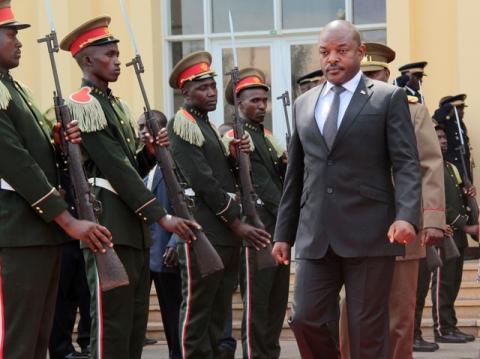Advertisement
Five political parties boycott Burundi peace talks
ARUSHA, Tanzania (Reuters) - Representatives of five parties that participated in Burundi's general election boycotted a second round of peace talks in the northern Tanzanian city of Arusha on Tuesday.
Burundi has been mired in crisis that has killed more than 450 people since President Pierre Nkurunziza pursued and won a third term last year. Opponents said his move violated the constitution and a peace deal that ended a civil war in 2005.
Dialogue in Bujumbura last year between the government and opponents failed to bridge differences, and talks mediated by Uganda earlier this year also swiftly stalled.
The five parties were unhappy over the decision of the mediator, former Tanzanian President Benjamin Mkapa, to invite Burundians accused of human rights violations and involvement in an attempted coup against Nkurunzinza in May 2015.
The five parties, FNL, FROLINA, PIEBU ABANYESHAKA, RADEBU and FRODEBU are concerned by the inclusion of Pacifique Nininahazwe of FOCODE party, Armel Ningoyere from ACT party in Burundi and Minani Jean in the dialogue.
"We are very surprised by their inclusion in the dialogue after all the humanitarian crisis they caused in Burundi," Jean Didier Mutabazi, RADEBU's president, told reporters at the venue of the talks.
"We don't see the point of continuing with the dialogue."
The government in Bujumbura also expressed its unhappiness over the inclusion of some participants with Willy Nyamitwe, Nkurunziza's communications adviser, complaining on Twitter.
"Jean Minani, Nininahazwe Pacifique, Armel Niyongere are being prosecuted and can't be invited in Burundi dialogue in Arusha," Nyamitwe wrote. Earlier in the day, three former presidents of Burundi were seen walking out of a closed session chaired by Mkapa.
Domitien Ndayizeye, Sylvester Ntibatunganya and Pierre Buyoya demanded the arrest of Ninihazwe, and the other two wanted in Burundi, a source in the Burundian delegation said.
Arusha was also the location for negotiations that led to the deal to end the ethnically charged 1993 to 2005 civil war in Burundi.
Renewed violence in Burundi has alarmed a region where memories of the Rwanda's 1994 genocide remain raw. Like Rwanda, Burundi has an ethnic Hutu majority and a Tutsi minority.
Till now, the violence in Burundi has largely followed political rather than ethnic loyalties. But diplomats fear ethnic wounds could reopen the longer violence continues.
(Reporting by Edward Qorro; Writing by Duncan Miriri; editing by Ralph Boulton)



















Add new comment